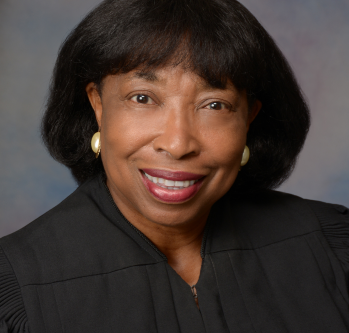
Hon. Bernice B. Donald
Judge, United States Court of Appeals for the Sixth Circuit
About Hon. Bernice B. Donald
The Honorable Bernice B. Donald received her law degree from the University of Memphis Cecil C. Humphreys School of Law, a LLM from Duke University School of Law, and an honorary Doctors in Law from Suffolk University. Prior to being appointed to the U.S. Court of Appeals by President Barack Obama in 2011, she served on the U.S. District Court for more than fifteen years. Judge Donald is currently a member of the prestigious American Law Institute and the American Bar Association Judicial Division. Previously, she served as Chair of the American Bar Association (“ABA”) Center for Human Rights and recently chaired a committee which published an implicit bias resource book for judges and practitioners titled, Enhancing Justice: Reducing Bias. Judge Donald also served as Chair of the ABA Criminal Justice Section, focusing on issues concerning implicit bias, children of incarcerated parents, mass incarceration, and the collateral consequences of incarceration. Having previously served as Secretary of the American Bar Association (ABA), Judge Donald served in the ABA House of Delegates until August 2018. She has been faculty at the National Judicial College, the Federal Judicial Center, and the Judge Advocate General’s Legal Center & School. Judge Donald also served as faculty for the Federal Magistrate Judges Conference held in Portland, Oregon, where she was part of the panel titled, Thinking, Blinking, and Judging: Addressing Implicit Biases. She served as Jurist in Residence at American University, Washington University, University of Cincinnati School of Law, and the University of Georgia School of Law. In addition, she has served as faculty for international programs in more than twenty countries. Judge Donald’s writings include the following: A Glimpse Inside the Brain’s Black Box: Understanding the Role of Neuroscience in Criminal Sentencing, 85 FORDHAM L. REV. 481 (2016); Not Your Father’s Legal Profession: Technology, Globalization, Diversity, and the Future of Law Practice in the United States, 44 U. MEM. L. REV. 645 (2014); Bringing Back Reasonable Inferences: A Short, Simple Suggestion for Addressing Some Problems at the Intersection of Employment Discrimination and Summary Judgment, 57 N.Y.L. SCH. L. REV. 749 (2012-2013); The Not-So-New Normal of the Legal Profession: Facing and Confounding the Odds, 23 AM. U. J. GENDER SOC. POL’Y & L. 1 (2014); Immigrants and Other Cultural Minorities as Non-Traditional Plaintiffs: Culture as a Factor in Determining Tort Damages, 92 JUDICATURE 220 (2009); Fifty Years Later and Miranda Still Leaves Us With Questions, 50 TEX TECH L. REV. 1 (2017); The Dischargeability of Property Settlement and Hold Harmless Agreements in Bankruptcy: An Overview of § 523(a)(15), 31 FAMILY L. QUARTERLY 409 (1997); To This Tribunal the Freedman Has Turned: The Freedman’s Bureau’s Judicial Powers and the Origins of the Fourteenth Amendment, 79 LA. L. REV. 1 (2018); When the Rule of Law Breaks Down: Implications of the 1866 Memphis Massacre for the Passage of the Fourteenth Amendment, 98 U. Boston L. Rev. 1607 (2018); She Stands on Her Own, Amongst Many: The Women of the Tennessee Supreme Court, 86.3 Tenn. L. Rev. 593 (2019); and Implicit Bias: Should the Legal Community Be Bothered?, 2 J. PLI Press, 615 (2018). Judge Donald has received over 100 awards for professional, civic, and community activities, including the Distinguished Alumni Award from the University of Memphis; the Martin Luther King Community Service Award; the Benjamin Hooks Award from the Memphis Bar Foundation; the prestigious Margaret Brent Award; the Spirit of Excellence Award; the John Pickering Award of Achievement; the University of Memphis Pillars of Excellence Award; and the Inaugural Liberty Award from the Tort, Trial and Insurance Section of the ABA. In 2020, at the request of the Labor and Employment Law Section, the American Bar Association established “The Judge Bernice Bouie Donald Diversity and Inclusion Award,” and Judge Donald was presented with the inaugural award.